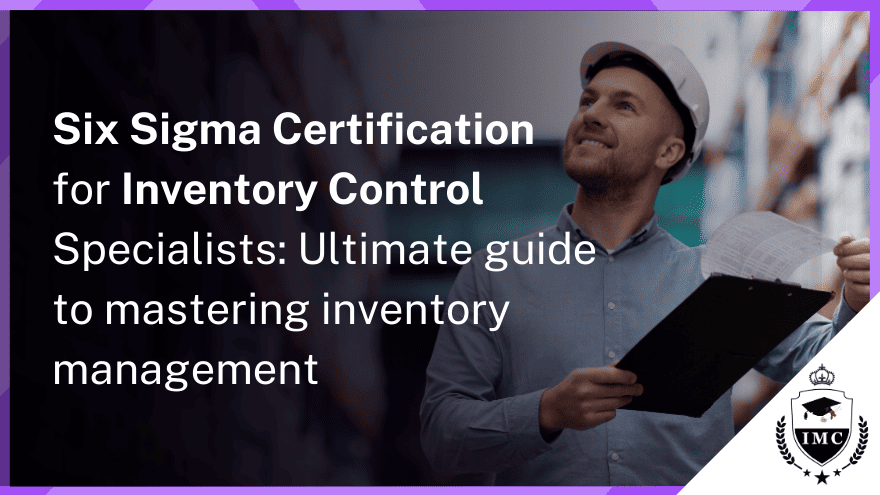Inventory control is a vital function for businesses across industries. Excess inventory ties up capital while inadequate stocks lead to lost sales and customers. Inventory control specialists play a key role in striking the right balance to optimize inventory investment while avoiding stock-outs. This requires accurately forecasting demand, setting robust reorder points, and maintaining real-time visibility into inventory. With increasing competition and customer expectations, organizations are continuously seeking ways to make inventory management leaner and more agile. This is where Six Sigma comes in. Six Sigma is a rigorous methodology to reduce defects and variability in processes. With its data-driven tools and focus on statistical analysis, Six Sigma enables organizations to significantly improve inventory processes. For inventory control specialists, a Six Sigma certification from an accredited institution like IMC Institute can be invaluable in developing new skills to tackle inventory challenges. In this post, we will explore how Six Sigma complements inventory management and the key benefits certification provides for inventory control specialists looking to advance their careers.
What is Six Sigma?
Six Sigma is a data-driven methodology focused on continuous process improvement and minimizing defects. By following the DMAIC framework (Define, Measure, Analyze, Improve, Control), Six Sigma empowers professionals to identify and eliminate inefficiencies, leading to significant cost savings, improved accuracy, and enhanced customer satisfaction.
Understanding the Importance of Six Sigma for Inventory Control Specialists
Inventory management is a multifaceted process that involves overseeing the flow of goods, minimizing costs, and maximizing efficiency. Six Sigma methodology provides a structured approach to identify and eliminate defects, reduce variability, and enhance process performance all of which are critical aspects of effective inventory control.
With Six Sigma certification, inventory control specialists gain proficiency in data-driven decision-making, statistical analysis, and process optimization techniques. By leveraging tools such as DMAIC (Define, Measure, Analyze, Improve, Control),
professionals can systematically identify areas for improvement, implement targeted solutions, and sustain performance gains over time.
Why is Six Sigma Crucial for Inventory Control Specialists?
As an Inventory Control Specialist, you juggle numerous responsibilities, from forecasting demand to managing stock levels, optimizing warehouse operations, and ensuring timely deliveries. Six Sigma equips you with the tools and techniques to tackle these challenges head-on:
Data-driven decision making: Replace guesswork with data-backed insights, leading to more accurate forecasts and optimized inventory levels.
Process improvement: Identify and eliminate bottlenecks, redundancies, and errors in your inventory management processes, streamlining operations and saving valuable time and resources.
Reduced costs: Minimize holding costs, stockouts, and waste through efficient inventory management practices.
Enhanced accuracy: Improve inventory tracking and control, minimizing errors and ensuring product availability.
Increased customer satisfaction: Timely deliveries and accurate order fulfillment lead to happier customers and a competitive edge.
Benefits of Six Sigma Certification for Inventory Control Specialists:
Career advancement:
Stand out from the competition and demonstrate your commitment to excellence with a recognized Six Sigma certification.
Increased earning potential: Certified professionals often command higher salaries due to their advanced skills and knowledge.
Enhanced credibility: Gain industry recognition and validation of your expertise in inventory management and process improvement.
Improved problem-solving skills: Develop a structured approach to identifying and resolving complex inventory challenges.
Network with industry professionals: Connect with other Six Sigma practitioners and expand your knowledge base.
Six Sigma Levels:
White Belt
- Entry-level introduction to Six Sigma principles and concepts.
- Attend awareness training sessions or online modules.Learn basic terms and high-level process improvement methodology.
- No project or exam required.
Six Sigma Yellow Belt Certification
- Foundational knowledge of Six Sigma tools and concepts.
- Participate in 1-2 week training covering topics like project management, process mapping, data collection, basic statistics.
- May work on small, narrowly focused improvement projects.
- Take a written exam to demonstrate understanding of concepts.
Six Sigma Green Belt Certification
- Administrator and team leader of Six Sigma projects.
- 4-5 weeks of in-depth online training.
- Learn advanced statistical analysis like hypothesis testing, DOE, regression, RTY analysis.
- Lead moderate complexity improvement projects. Identify defects, root causes, implement solutions.
- May coach Yellow Belts.
- Pass written exam and demonstrate projects/problem solving abilities.
Six Sigma Black Belt Certification
Full-time Six Sigma expert and project leader.
Complete 4-5 months of rigorous training including statistics, Design for Six Sigma, process excellence.
Lead complex, high-impact improvement projects from start to finish. Coach and mentor Green Belts.
Pass written exam and demonstrate mastery through project completion and presentation.
Six Sigma Master Black Belt Certification
- Subject matter expert and coach for Six Sigma implementation.
- Have at least 5 years experience as Black Belt on complex projects.
- Act as organization advisor, provide training, mentor Black Belts.
- Help define and implement Six Sigma strategy across the organization.
- Continued work on innovative and challenging improvement initiatives.
IMC Institute: Your Gateway to Six Sigma Excellence
At IMC Institute, we offer comprehensive Six Sigma certification programs tailored to the specific needs of Inventory Control Specialists. Our experienced instructors provide in-depth training on the DMAIC methodology, equipping you with the practical skills and knowledge to optimize your inventory management processes and achieve tangible results.
Summary
For inventory control specialists, a Six Sigma certification delivers tangible benefits by providing a structured approach to optimizing inventory processes. Specialists gain expertise in using data-driven tools to improve forecast accuracy, set robust stock levels, increase inventory turns, and reduce carrying costs.
Certification also helps develop leadership abilities to implement organizational change and instill a culture of continuous improvement. With in-depth Six Sigma training from reputable institutes like IMC Institute, inventory control specialists can play a bigger role in driving process excellence around inventory activities.
The methodical, metrics-based approach of Six Sigma allows for sustainable gains over time. As customer expectations and competition continue to rise, Six Sigma certification can help inventory specialists maintain lean and efficient inventory operations that lower costs while improving customer service. The transferable skills gained open up new career opportunities as well.






